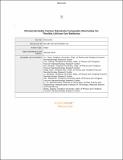Ultrastretchable carbon nanotube composite electrodes for flexible lithium-ion batteries
Author(s)
Yu, Yang; Luo, Yufeng; Wu, Hengcai; Jiang, Kaili; Li, Qunqing; Fan, Shoushan; Li, Ju; Wang, Jiaping; ... Show more Show less
DownloadAccepted version (1.663Mb)
Open Access Policy
Open Access Policy
Creative Commons Attribution-Noncommercial-Share Alike
Terms of use
Metadata
Show full item recordAbstract
© 2018 The Royal Society of Chemistry. Ultra-stretchable carbon nanotube (CNT) composite electrodes for lithium-ion batteries are fabricated by coating CNT films and active material powders on biaxially pre-strained polydimethylsiloxane (PDMS) substrates. The wrinkled structures that form during the pre-straining and release process extend along the strain axis to protect the CNT composite structures from fracture. The CNT composites demonstrate excellent stability and high durability with resistance increase of less than 12% after 2000 cycles at 150% strain. Both CNT/Li4Ti5O12 (LTO) anodes and CNT/Li(Ni1/3Co1/3Mn1/3)O2 (NCM) cathodes maintain excellent electrochemical properties at cyclic 150% strain in different axes. The full lithium-ion battery consisting of the stretchable CNT/LTO anode and CNT/NCM cathode is able to withstand 150% strain in different axes without large decreases in performance. Stretchable batteries fabricated by the scalable, highly efficient, and low-cost biaxial pre-strain process with excellent durability and electrochemical properties will have potential applications in flexible devices.
Date issued
2018Department
Massachusetts Institute of Technology. Department of Nuclear Science and Engineering; Massachusetts Institute of Technology. Department of Materials Science and EngineeringJournal
Nanoscale
Publisher
Royal Society of Chemistry (RSC)